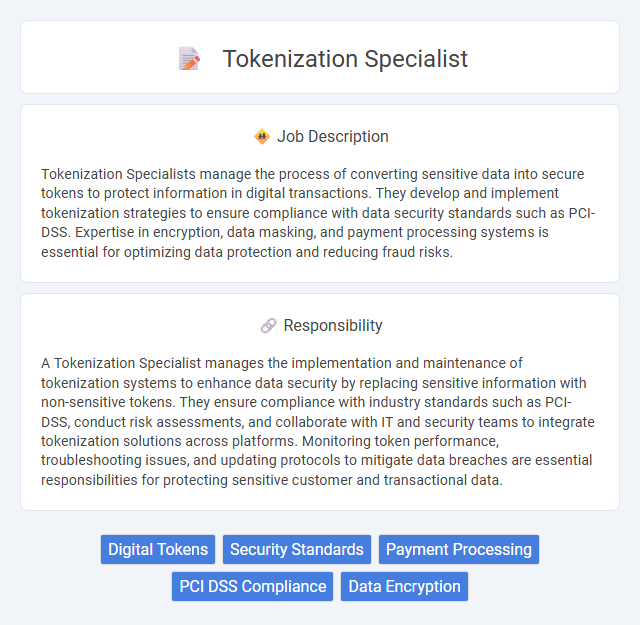
Tokenization Specialists manage the process of converting sensitive data into secure tokens to protect information in digital transactions. They develop and implement tokenization strategies to ensure compliance with data security standards such as PCI-DSS. Expertise in encryption, data masking, and payment processing systems is essential for optimizing data protection and reducing fraud risks.
Individuals who are detail-oriented and comfortable working with complex data are likely to be well-suited for a Tokenization Specialist role. Those who prefer repetitive tasks or have strong analytical skills may find the job aligns with their strengths, while people who struggle with accuracy or data security protocols might face challenges. It is probable that candidates with a background in IT or finance will adapt more easily to the responsibilities involved in tokenization processes.
Qualification
Tokenization Specialists require expertise in cybersecurity protocols, data encryption techniques, and compliance with PCI DSS standards to effectively convert sensitive information into secure tokens. Proficiency in programming languages such as Python, Java, or C++ and experience with cloud platforms like AWS or Azure are essential for implementing tokenization solutions. Strong analytical skills combined with knowledge of payment processing systems and regulatory requirements enhance a specialist's ability to safeguard data and reduce payment fraud risks.
Responsibility
A Tokenization Specialist manages the implementation and maintenance of tokenization systems to enhance data security by replacing sensitive information with non-sensitive tokens. They ensure compliance with industry standards such as PCI-DSS, conduct risk assessments, and collaborate with IT and security teams to integrate tokenization solutions across platforms. Monitoring token performance, troubleshooting issues, and updating protocols to mitigate data breaches are essential responsibilities for protecting sensitive customer and transactional data.
Benefit
Tokenization Specialist roles likely offer significant benefits such as enhanced expertise in data security and privacy, increasing employability in the growing fintech and cybersecurity sectors. Professionals in this field may gain experience with cutting-edge technologies, boosting their market value and career advancement opportunities. The demand for tokenization skills probably leads to competitive salaries and the potential for work in innovative, high-impact projects.
Challenge
Tokenization Specialists likely face challenges in ensuring secure and efficient conversion of sensitive data into tokens while maintaining compliance with evolving regulatory standards. The role probably demands constant adaptation to emerging technologies and threats, increasing the complexity of safeguarding data integrity. Balancing operational efficiency with stringent security measures is expected to be a persistent challenge in this field.
Career Advancement
A Tokenization Specialist is crucial in enhancing data security by converting sensitive information into secure tokens, a skill highly sought after in fintech and cybersecurity sectors. Mastery in tokenization protocols and cryptographic methods opens pathways to advanced roles such as Information Security Manager or Data Protection Officer. Continuous learning in blockchain technology and compliance standards accelerates career progression and increases marketability in evolving digital security landscapes.
Key Terms
Digital Tokens
A Tokenization Specialist manages the creation, implementation, and security of digital tokens used in blockchain and fintech applications. Their expertise includes developing smart contracts, ensuring compliance with regulatory standards, and optimizing token ecosystems for user engagement and transaction efficiency. Proficiency in cryptographic protocols and decentralized platforms is essential for maintaining the integrity and scalability of tokenized assets.
Security Standards
Tokenization specialists implement security standards such as PCI DSS to protect sensitive payment data by replacing it with unique tokens that have no exploitable value. They design and maintain tokenization systems that reduce risk of data breaches and ensure compliance with industry regulations. Expertise in encryption protocols and secure key management is essential to uphold data integrity and safeguard customer information.
Payment Processing
Tokenization Specialists play a crucial role in payment processing by converting sensitive payment card information into secure, non-sensitive tokens that reduce fraud risks during transactions. These professionals ensure compliance with PCI DSS standards while optimizing data security protocols across digital payment platforms. Expertise in cryptographic techniques and payment gateway integration is essential for maintaining transaction integrity and consumer trust.
PCI DSS Compliance
A Tokenization Specialist ensures sensitive payment data is replaced with secure tokens, reducing the risk of data breaches and maintaining PCI DSS compliance. They implement tokenization solutions that protect cardholder information by substituting primary account numbers (PANs) with non-sensitive equivalents, minimizing the scope of PCI audits. Expertise in Payment Card Industry Data Security Standard (PCI DSS) requirements enables seamless integration of tokenization processes within existing security frameworks.
Data Encryption
A Tokenization Specialist expertly converts sensitive data into secure tokens, enhancing data encryption processes to protect information from cyber threats. Utilizing advanced algorithms and cryptographic techniques, they ensure compliance with industry standards such as PCI-DSS and GDPR. Their role is critical in safeguarding payment data and personal information, minimizing risks of breaches and unauthorized access.
 kuljobs.com
kuljobs.com